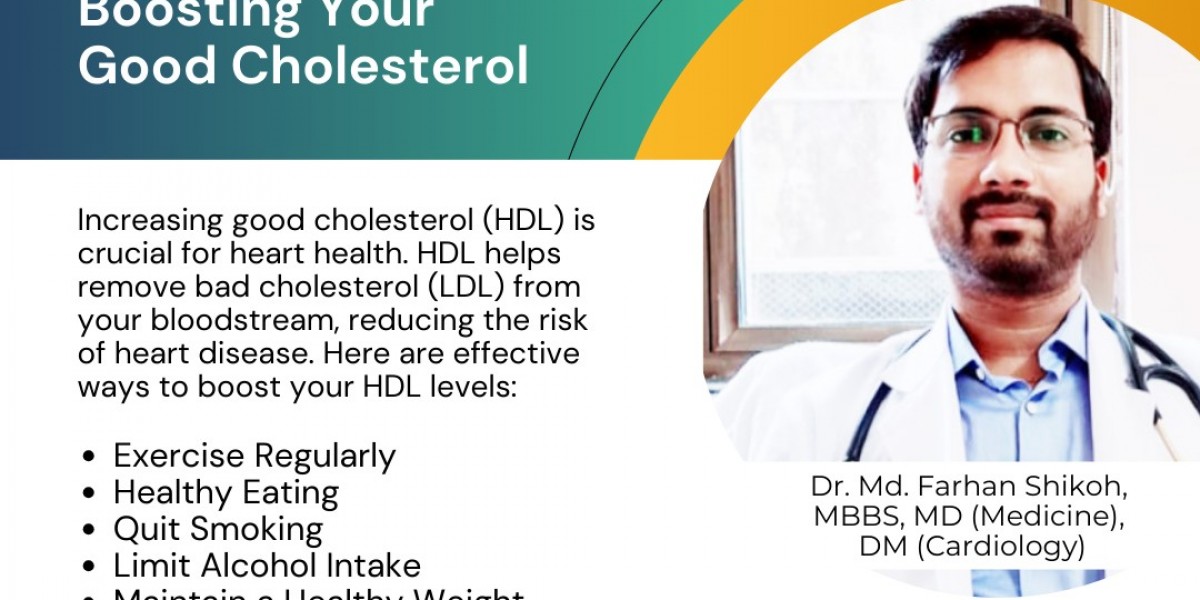Maintaining a healthy balance of cholesterol in your body is crucial for overall heart health. Cholesterol, a waxy substance found in your blood, comes in two main types: low-density lipoprotein (LDL), often referred to as "bad" cholesterol, and high-density lipoprotein (HDL), known as "good" cholesterol. While LDL can lead to plaque buildup in the arteries, increasing the risk of heart disease, HDL helps to remove excess cholesterol from the bloodstream, reducing these risks.
Understanding HDL Cholesterol
High-density lipoprotein (HDL) is often termed "good" cholesterol due to its protective role in heart health. HDL cholesterol helps transport excess cholesterol away from the arteries and back to the liver, where it can be processed and eliminated from the body. Higher levels of HDL cholesterol are associated with a lower risk of heart disease, making it essential to focus on ways to boost these beneficial levels.
Ways to Increase HDL Cholesterol
Adopt a Heart-Healthy Diet:
- Include Healthy Fats: Monounsaturated and polyunsaturated fats, found in foods like avocados, nuts, and olive oil, can help increase HDL cholesterol. Omega-3 fatty acids, present in fatty fish such as salmon, sardines, and mackerel, also contribute to higher HDL levels.
- Increase Fiber Intake: Soluble fiber, found in fruits, vegetables, and whole grains, can improve cholesterol levels by helping to reduce LDL cholesterol and increase HDL cholesterol.
- Reduce Saturated and Trans Fats: Limiting your intake of saturated fats (found in red meat and full-fat dairy products) and trans fats (present in many fried and processed foods) can help manage LDL levels while promoting a better HDL balance.
Engage in Regular Physical Activity:
- Exercise Consistently: Regular physical activity, especially aerobic exercises such as brisk walking, jogging, or cycling, can help raise HDL cholesterol. Aim for at least 150 minutes of moderate-intensity exercise or 75 minutes of vigorous exercise per week.
- Incorporate Strength Training: Adding strength training exercises to your routine, such as weight lifting or resistance exercises, can further enhance your cholesterol profile.
Maintain a Healthy Weight:
- Achieve and Sustain a Healthy Weight: Excess body weight can negatively affect your cholesterol levels. Losing weight, particularly if you're overweight or obese, can improve HDL cholesterol levels and overall heart health.
Limit Alcohol Consumption:
- Moderate Alcohol Intake: Drinking alcohol in moderation can have a positive effect on HDL cholesterol. For women, this means up to one drink per day, and for men, up to two drinks per day. However, excessive alcohol consumption can lead to adverse health effects, so moderation is key.
Quit Smoking:
- Avoid Tobacco Products: Smoking negatively impacts your HDL cholesterol levels and contributes to a higher risk of heart disease. Quitting smoking can lead to improvements in your cholesterol levels and overall cardiovascular health.
Consider Medications if Needed:
- Consult with Your Doctor: In some cases, lifestyle changes alone may not be sufficient to achieve optimal HDL cholesterol levels. If needed, your healthcare provider may prescribe medications to help manage cholesterol levels more effectively.
Consulting a Specialist
If you are concerned about your cholesterol levels or need personalized advice on boosting HDL cholesterol, consulting with a cardiologist can provide valuable insights and tailored recommendations. Dr. Md. Farhan Shikoh, MBBS, MD (Medicine), DM (Cardiology) at Sukoon Heart Care in Ranchi is renowned as one of the best diabetes doctor in Ranchi and offers expert guidance on managing cholesterol levels and improving heart health. For consultations, you can reach out to him at 6200784486 or visit the website drfarhancardiologist.com.
Incorporating these lifestyle changes can lead to significant improvements in your HDL cholesterol levels and overall heart health. Prioritizing heart-healthy habits and seeking professional guidance are crucial steps towards a healthier, more vibrant life.








